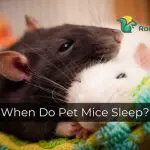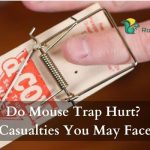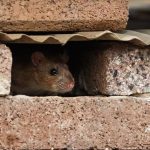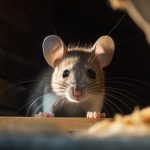What Happens If You Disturb A Mouse Nest? [Explained]
Coming across a mouse nest is usually an off-putting experience, especially if it’s in your own home. While nesting is common for these animals, most people don’t enjoy this and often destroy it!
However, what happens if you disturb a mouse nest? When doing so, people often harm the mice. This leads to a stress response in the animal, so they may attack you as a defense mechanism. Moreover, incorrectly destroying the nest increases the risk of infestation and diseases.
Keep reading as we will give you a more detailed answer to your question. Additionally, we will tell you the risks of a mouse nest at your home and how to get rid of it.
What Do Mice Need A Nest For?
Like most animals, mice mainly build their nests to raise the little ones. They are required to protect their young; without them, it’s hard for the babies to survive. Moreover, the female mice use the nest to give birth.
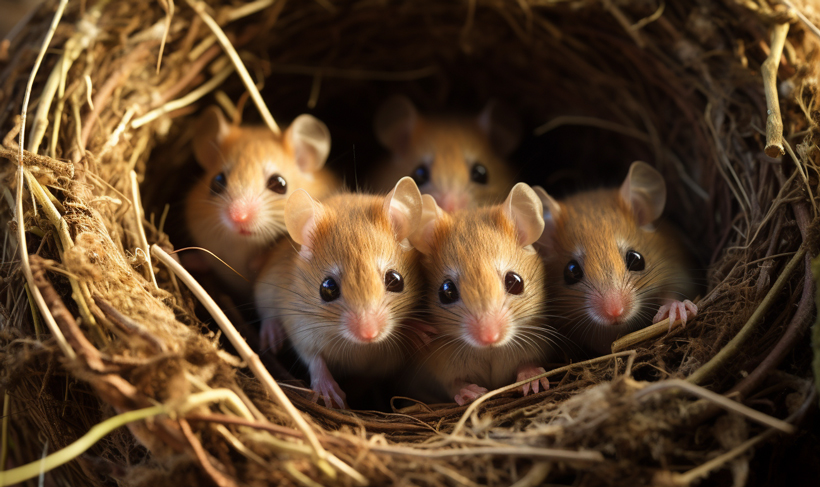
Also, nests are needed for adult mice. They store food in them and use it to keep themselves warm during the winter. Moreover, these nests are built in a specific way to provide insulation. For which they often steal insulating materials around them!
Finally, nests are also used for safeguarding all sizes of mice, not just the young ones. The nest keeps them protected from bigger predators.
What Happens If You Disturb A Mouse Nest?
While you may feel an irresistible urge to get rid of a mouse’s nest, you must think before doing so. Disturbing their home brings consequences that most people aren’t aware of. Such as:

Stress response of the mice
A disturbed nest might trigger a stress response in the mice. This can cause them to be anxious to the extent that they start behaving strangely. This can have a severe impact on their health, especially on the young ones.
Hurt the mice
When disturbing the nest, people always hurt the mice in it. Even if it’s unintentional, some mice are injured or killed. Moreover, unlike the older ones, the young mice can’t escape when the nest is being destroyed. This puts them in a vulnerable position where they might be unable to survive.
Attack from the mice
If you’re personally handling the mice nest, you will likely get bitten. But mice aren’t usually very aggressive. When under stress, they can bite you or attack you in other forms. This is a defense mechanism of the mice, which can transfer diseases.
Increased disease and infestation
They spread out in different directions when their nest is disturbed. This increases the risk of infestation. Additionally, being spread out doesn’t stop them from reproducing. They multiply quickly, thus further increasing the risk of infestation.
Moreover, mice are known to be disease carriers. So, as the mice spread around, the diseases in them spread too. This increases exposure to different diseases such as Hantavirus and ticks.
Can Mice Return To A Disturbed Nest?
Mice may return to their disturbed nest for various reasons. The most common reason is the mother coming back to protect her little ones. The little ones often get left back in the nest, so the motherly instinct of a female mouse drives her to come back.

Moreover, they might come back again to rebuild their home. The place where they initially built their nest was their safety net. If that place isn’t taken care of, it can still provide them with the same protection.
However, if the nest has been destroyed properly, the mice are less likely to return. They are smart enough to realize the location isn’t safe enough to come back to. So, correct sanitary methods should be taken at the location to get rid of the mice completely.
Is It Safe To Have Mice Nesting In Your House?
No. While these little animals look harmless, having mice nesting in your home is not safe. As mentioned earlier, they increase the risk of infestation. Another major concern is that they will eat anything they can find. Mice will raid your pantry and kitchen, especially if they’re nesting.

They will contaminate your food when trying to steal it. Also, some mice may defecate on your food, creating foodborne diseases. This can cause you to fall sick severely.
Not only do they affect your health but also your home. While building their own homes, mice may destroy yours. They love gnawing and chewing on wires, soft concrete, wooden furniture, plastic pipes, and insulation. If this continues for a long period, your house will have severe structural damage.
Moreover, they can create unpleasant odors in your house. You may find their urine or feces in your cabinets and pantry.
Finally, once you let them in your house, it’s going to be hard to get rid of them. Mice usually know their way back. Moreover, their smallness gives them the advantage of sneaking in. They can get in through small cracks in your walls and pipes.
How To Remove Mice Nests From Your House?
Removing the nest with the correct methods is crucial if you don’t want the mice to return. Also, if the infestation is out of control, contact a pest control company,

Here are the steps to follow if you can do this on your own:
Step 1: Protect yourself
Wear disposable gloves and masks to protect yourself from the diseases.
Step 2: Remove the mice if present
You don’t want to hurt the mice. Pick them up gently and put them in a container. Make sure the container is closed, but let some air enter it. Give the mice to your local animal shelter.
Step 3: Dispose the nest
We recommend you burn the nest completely. Make sure there is no flammable material beside the nest. If you can’t burn it, place it in a sealed bag. Throw away the sealed bag in a closed trash can so no animal can access it.
Step 4: Clean the location of the nest in your house
You have to completely disinfect the location and areas near the location. Use bleach for it. Also, clean your pantry, as mice usually raid it in search of food.

Step 5: Take precautions for the future
To prevent mice from entering, close off any cracks or holes in your house. Use hard materials for it, such as cement or metal. Additionally, keep your house clean. Don’t leave any food open and clean up crumbs or spillage immediately.
Step 6: Look out for future infestation
You have to frequently inspect your home. Check your pantry, attics, or any enclosed spaces. Also, keep monitoring the location where the nest was. Some mice may return.
FAQ
Dealing with mice can be difficult. In this section, we’ll answer some of the most common queries regarding them!
Q. Where do mice make their nests in a house?
For their nests, mice usually prefer a dark, enclosed space. So, it can be inside an unused drawer, cabinet, or in your attic or basement.
Q. Can mice survive without a nest?
Most adult mice can survive without a nest. However, the mother mouse may find it hard to give birth or take care of her newborns without one.
Q. Does killing mice get rid of them?
Killing them is probably the most efficient permanent way. However, some consider it to be unethical and cruel, especially because there are other effective ways to repel mice.
Conclusion
So, what happens if you disturb a mouse nest? There are several consequences. However, it can harm the mice, especially if they’re still babies. Moreover, it can harm people, too as it increases the risk of infestation. It also increases the risk of diseases spreading from mice.
If you notice a mouse nest in your house, keeping them is unsafe. We recommend you get rid of it as soon as you can. You can contact a pest control agency for it. However, you can easily do it on your own too. Just follow the guidelines we’ve provided you with. Good luck!

